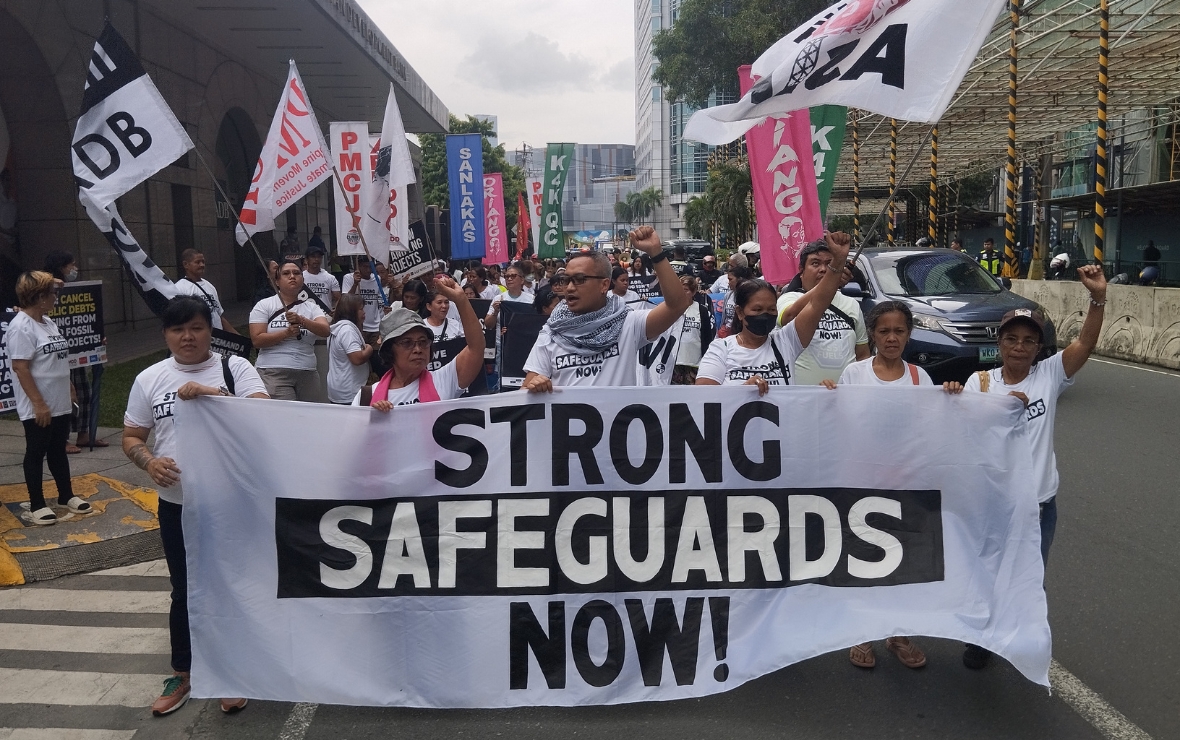Manila, Philippines – Leading up to the Asian Development Bank’s (ADB) anticipated mid-July release of the R-paper, the Forum network and its allies have voiced significant apprehensions regarding the proposed Environmental and Social Framework (ESF). These concerns were prominently articulated during the recent annual meeting in Tbilisi, Georgia, underscoring a collective demand for strengthened safeguards across ADB-funded projects.
“Central to the concerns expressed by civil society is the policy architecture,” stated Hasan Mehedi from CLEAN (Coastal Livelihood and Environmental Action Network). “CSOs argue that the current draft ESF’s mitigation hierarchy approach undermines essential prerequisites for environmental and social risk assessment and compliance before loan approval. They insist on retaining the 120-day disclosure period for impact assessments to ensure transparency and accountability.”
Lidy Nacpil, coordinator of the Asian Peoples’ Movement on Debt and Development (APMDD), expressed apprehension that current ESF standards in co-financed projects may not uphold the highest safeguards, potentially risking adverse impacts on communities and the environment. “We demand a complete overhaul of the draft ADB safeguards. We have seen how ADB has repeatedly failed to keep communities safe from harmful projects, such as those that destroy regions home to indigenous peoples and endangered species, as well as projects that exacerbate debts, conflicts, and extractivism. The highest social and environmental standards must be ensured in the safeguards policy for co-financed projects. However, the language in the new ESF reflects glaring loopholes that expose communities to more of the same risks from harmful projects,” Nacpil said.
Environmental and social standards, especially ESS 3 and International Standards Alignment, are crucial, emphasized advocates. They stressed the need to extend safeguards to cover third-party contractors and informal workers, aligning with international conventions such as Basel, Stockholm, and Rotterdam to meet or exceed standards set by other financial institutions.
According to Brex Arevalo, Climate and Anti-Incineration Campaigner of Global Alliance for Incinerator Alternatives, aligning with international conventions and agreements is critical in protecting the environment and people both during and after project operations. “The Basel, Rotterdam, Stockholm, and Minamata Conventions, which regulate hazardous substances, have been signed and ratified in most countries where the ADB operates. Yet, we have monitored several cases involving communities and CSOs where workers are directly exposed to toxic chemicals and pollutants emitted and discharged into the atmosphere and surroundings with little to no consequences,” says Arevalo. He also added that Just Transition plans must be operationalized following recommendations by the International Labour Organization so that all members of society, including those in the informal workforce, are included in any shifts towards a genuine clean and renewable energy system.
Advocates also call for specific measures to address reprisals and protect civic spaces, including comprehensive human rights impact assessments alongside environmental and social evaluations.
Concerns about ‘climate smart mining’ projects in Mongolia and their risks to land, environment, and Indigenous Peoples’ rights defenders were highlighted, underscoring the need for explicit protocols in financing. According to Sukhgerel Dugersuren, Chair of OT Watch Mongolia, “there should be no more mining to support continued excessive consumption of goods and services resulting in climate change. ADB’s so-called ‘climate smart mining’ initiatives must be stopped to protect our land, environment, and Indigenous Peoples’ rights. The dangers of ‘climate smart mining’ in Mongolia highlight the urgent need for rigorous human rights impact assessments and a complete end to these destructive projects.”
Advocates also call for specific measures to address reprisals and protect civic spaces, including comprehensive human rights impact assessments alongside environmental and social evaluations. Furthermore, there is criticism over ADB’s assessment of Country Safeguard Systems, where potential deregulation of Environmental Impact Assessment laws could weaken environmental reporting and stakeholder consultation standards.
Civil society groups urge the ADB to strengthen ESF language, ensuring mandatory risk assessments and compliance standards across all projects. Transparent financial practices and robust protections for communities and the environment in co-financed initiatives are essential.
The ADB is in the critical stage of deliberating on the Environmental and Social Framework Policy, currently being reviewed after thirteen years. Project-related ecological and social disasters have been identified as ADB implementation failures even by its Independent Evaluation Department’s 2021 report. Yet, the ADB is considering restructuring its safeguards, hinting at abrupt shifts towards deregulations and reduced environmental and social reporting by its clients.
“This must be challenged!” says Rayyan Hassan, executive director of NGO Forum on ADB. “ADB cannot dilute its environmental and social safeguards rules and must ensure that implementation is upheld with utmost urgency to do no harm to project-affected communities,” he added.
The Forum Network and allies call on the ADB to heed the people of Asia Pacific, deliver on its promise of “Do No Harm,” and ensure stronger and more rigorous safeguards to hold all clients and borrowers accountable.









